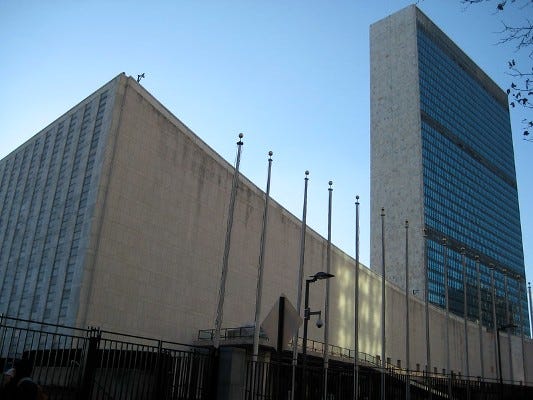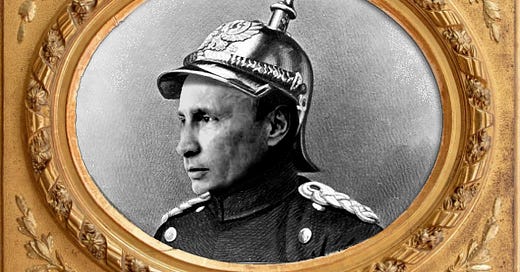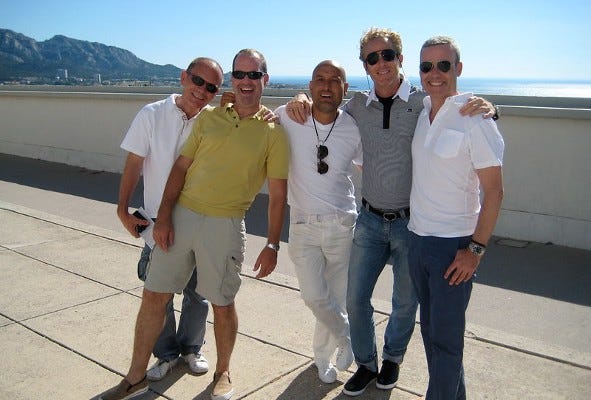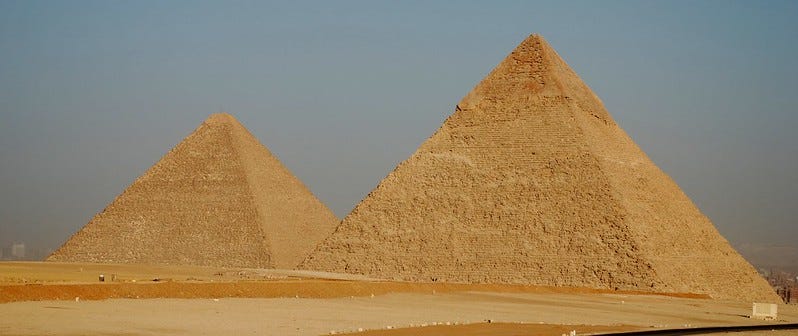Strangely, one professor I developed a relationship with during grad school was John Mearsheimer. I say “strangely” because he and I agreed on basically nothing. He’s synonymous with the realist school of foreign policy, and I was a 24 year-old naïf with enough idealism to make the Snuggle Bear look like a hardened cynic. Even so, Mearsheimer would have long talks with me during office hours as if I was a real person. My memory of those conversations is that I would make full-throated arguments about the power of ideas, and about how the post-Cold War world was a new era, and about how things we learned from Otto von Bismarck weren’t really relevant in out modern, enlightened age. And then he would respond with the intellectual version of this:
At any rate: I like the guy. So, I was glad to hear him on Andrew Sullivan’s podcast explaining how the West has failed to understand how Vladimir Putin sees the world. This moment in foreign policy, horrible as it is, is something of a vindication for realists. The end of the Cold War led to grand pronouncements about how history had hit an inflection point, and liberal democracy had decisively won; this sentiment was most famously captured by Francis Fukuyama’s The End of History and the Last Man. That was a tough moment for realists; it was probably like living with a Patriots fan during the Tom Brady era. Now, realists are understandably engaging in a bit of told-ya-so-ing after 30 years of lollipops-and-rainbows-and-Tom Friedman books hippie wankery.
But I’m writing today to pick one more friendly argument with John Mearsheimer. I agree that the realist school — which he typifies — explains Vladimir Putin’s actions remarkably well. And in the 18 years since I finished grad school, I’ve conceded an Warsaw Pact-sized amount of territory to Mearsheimer’s world view; I have a lot more sympathy for realism than I used to. But I don’t think that realism’s victory is total. Though Russian tanks are currently rolling through Ukrainian streets in a display of power politics that would make Klemens von Metternich erect, I think that’s only part of the story. Putin shows that some leaders still see the world in terms of zero-sum conflict, but I don’t think it follows that that will always be true.
Let me briefly recap the relevant theories in a way that’s maximally insulting to both. Liberalism believes that international relations are perpetually on the brink of some kind of peace-and-love hippie hootenanny — think the “Aquarius” scene from Hair. They take note of the fact that established democracies don’t go to war with each other and ignore the fact that “established democracies” mostly only exist in one relatively small part of the world, which happens to be the part of the world where most of the people who write about liberalism live (what a coincidence!). They place great value in international institutions like the United Nations despite the fact that, as a peacekeeping institution,1 the UN has a record for feckless indifference that would impress even the laziest of substitute teachers.

Liberals think that cooperation and peace are possible. They see the fact that Homo sapiens is currently mired in a 200,000 year streak of uninterrupted warfare as a bit of dastardly luck; surely the two-hundred-thousand-and-first year will be better. It’s all a matter of fostering the right normative values, and then proliferating those values through international institutions, or maybe through a really influential star-studded celebrity benefit song, like this:
Realists are having none of that shit. They think that the liberal dream of peace is like a three year-old’s dream of growing up to be a unicorn — good luck with that! They could care less about how a country is governed. You’re a liberal democracy? Nifty. Your president’s a nice guy? Who cares? Good father? Fuck you, go home and play with your kids. To realists, countries are countries, Russia is France is Malaysia is Paraguay, and pretending that they’re fundamentally different makes about as much sense as assigning personality traits to a pile of rocks.
To realists, the only thing that matters is the international system. But there is no international system: We’re in a state of anarchy. There is no order, no safety, just self-interested actors clawing each other’s eyes out in a desperate battle for relative advantage — it’s a lot like boarding a train in Italy. With that being true, the best thing a country can do to survive is accrue power. This is why, historically, realists have been obsessed with things like steel production: steel = artillery = power = no Germans marching down the streets of your capital. Peace can only be achieved temporarily and under special conditions, which is how they explain the fact that the only places with Germans marching down the streets these days are popular vacation spots in the Mediterranean.
You can probably see how Putin’s actions buttress the realist worldview. I don’t think that most people in the ‘90s realized how threating NATO expansion would be from Putin’s point of view. To an American, the fact that we’re not going to invade Russia is patently obvious. I mean, really: Can you imagine a universe in which the United States — with the help of NATO powers like Iceland and Estonia — invades and annexes Russia? And then Americans colonize their new possession by settling in, say, Siberia? I mean, I’m a New Yorker, I pay insane rent for a modest two-bedroom apartment, so I actually would consider moving to Siberia even if my new house spent most of the year under ten feet of snow and reindeer dung. But most Americans would not.
Of course, the fact that this scenario is inconceivable to most Americans doesn’t matter; what matters is what Vladimir Putin thinks. And Putin, it should be noted, is an extraordinarily weird guy. Consider: He announced the occupation of Donetsk and Luhansk in a state-televised, two-hour-long national security council meeting (what kind of sick fuck schedules a two hour meeting?), followed by a rambling, one hour speech that culminated in recognizing the breakaway “republics”. The whole thing was bonkers; in any democracy, he would have paid a steep price for pre-empting Celebrity Big Brother. But he’s the guy who makes decisions in Russia, so his worldview is the one we have to understand.
Putin is clearly in an “it’s all about relative power” mindset. Here are some quotes from his speech:
(about NATO expansion) “Why was it necessary to make an enemy out of us? They didn’t want such a large, independent country as Russia.”
(about the possibility of Ukraine joining NATO) “We clearly understand that in such a scenario, the degree of military threat to Russia will rise cardinally, by multiple times.”
“The purpose is single: to keep Russia behind, to prevent it from developing. And they will do it before even without any formal pretext. Just because we exist.”
Putin sees Russia as besieged. He can’t comprehend that American troops in Estonia are there to protect Estonia; all he sees are American tanks 500 miles from Moscow. And to Putin, the prospect of Ukraine joining NATO presents an intolerable threat. I should emphasize that I think this view is completely batshit; I am absolutely not joining those on the dinosaur left or wacko right who seem to be saying “Putin makes some good points!” I think Putin’s view of Russia’s security situation is completely wrong, but nonetheless: It’s his view.
The world of peace and shared values that many liberals felt was inevitable 30 years ago has not arrived. Instead, we’re forced to deal with a guy would like to return to the '80s about as much as David Lee Roth. We were wrong to think that a world without power politics was at hand or in any way inevitable.
I think this points to a common shortcoming among liberals: We see the world as we want it to be, not as it is. We craft theories based on hopeful visions of the world because we want to believe that progress is close at hand. But sometimes, it just isn’t. Not enough liberals in 1945 said “The UN Security Council won’t work — we just handed a veto to a guy who is literally Joseph Stalin.” Not enough liberals in the ‘90s said “Russia has changed their flag so that it looks like Luxembourg’s, and that’s great, but let’s understand that not everyone in Russia agrees that the Cold War is over.” That’s real turd-in-the-punchbowl stuff, and nobody wanted to say it. Of course, it happened to be true.
But if liberals are optimists, I’d argue that realists are pessimists. Just because things have always been one way doesn’t mean that they’ll always be that way. I am, of course, ceding an enormous amount of ground to the realists; I’m basically saying “you may have won this round, and the round before it, and the ten million rounds before that, but one day, you might not win a round.” But the realist belief that the international system will never change is the sticking point for me. I think it can change, and in fact has changed in a few cases.
The fact that the “years without a horrifically bloody war” sign outside of Western Europe hit “77” this year is remarkable. There used to be nothing Western Europe loved more than tossing untold numbers of soldiers and civilians into the meat grinder in the interest of, say, moving the border of the German/Danish Schleswig-Holstein region ten centimeters. But that seems to be in the past. You know what Schleswig-Holstein is known for now? A rather nice beach frequented by Germans and Danes alike. You can even get in the water if you’re comfortable with your balls freezing off and floating away towards Scotland.
Realists — and Mearsheimer, specifically — think that Western Europe’s peaceful turn is the result of a Pax Americana that’s persisted despite the end of the Cold War (or what we thought was the end of the Cold War). Mearsheimer believes that if the US dissolved NATO and skipped town, Western Europe would be back at each other’s throats. And maybe he’s right; honestly, part of me would find it exhilarating to wake up to a headline reading: “WHOA: BELGIUM INVADES LICHTENSTEIN!” I would not see that coming! I’m tired of the same old media narratives — I want to see jack-booted Belgian thugs rolling through the storybook streets of Lichtenstein in tanks made of chocolate. That would be an interesting change of pace!
Of course, that’s funny to me because I think it’s ridiculous. Much of my writing has been about the quasi-religious fervor that I think is rising on the left; I think a powerful belief system is causing people to act in strange ways. I can’t write about the power of beliefs in the domestic sphere and then do an about-face and pretend that they don’t exist in the international sphere. I think that normative values exist, and I think they can drive, do drive, and have driven decisions in international relations. Western Europe’s turn towards peace is largely2 the result of the fact that — after exploring the bloody alternative — they’ve decided that between themselves, war is something that’s just not done, Old Boy. I think that to deny these considerations is to deny the power of belief systems, and belief systems have been behind some of the most extreme actions in human history.
Ukraine is now the physical location of the ideological split between those who see the world exclusively in terms of power and those who don’t. The West (mostly) believes that security between states can be achieved through cooperation. Putin does not. Eastern Europe is literally in the middle. The West was slow to realize that the assumed triumph of our belief systems had not, in fact, happened, and we may have played our cards very differently if we’d been seeing the world through clearer eyes. I continue to believe that Russia’s present doesn’t have to be its future; the fact that I can sit here today and crack light-hearted jokes about Germans invading France just goes to show how much things can change. One day, Russia may have a less paranoid, more peaceful leader. Unfortunately, that day is not today.
I’m being glib for effect, but I feel like I should clarify: In my opinion, the UN has some important functions. It is a valuable source of international data, and it’s had some notable success on narrow issues (especially relating to disease eradication). It can also facilitate diplomacy — it’s the building where all the diplomats are! — which is helpful. Of course, it was created largely to be a guarantor of international peace, and it has not been that. Russia, which has a veto on the Security Council, can simply shoot down any and all measures related to Ukraine (or anything else). So, while I’m joking when I say that the building should be converted into condos, I’m serious when I suggest that the UN Security Council is mostly incapable of executing its mission.
I’m putting a lot of weight on the word “largely” here. I do think there are other reasons why war is a thing of the past as far as Western Europe is concerned, such as the fact that possessing land is no longer the main way of accruing wealth.








Interesting article. I think "The tragedy of great power politics" by Mearsheimer is a great book. It certainly seems to explain the last few hundred years of international relations pretty well. I don’t like it, but as you say, that’s just not the point.
You think the US loves freedom and democracy? US policy towards Iran, Iraq, Syria, Libya, the Saudi war against Yemen says no not really. The US loves balance of power politics. Freedom and democracy are buzzwords to keep the voters happy.
If you were Russian you might be as concerned about Ukraine joining NATO as the US was about nuclear weapons in Cuba in the 1960s. Imagine the US reaction if Mexico joined a China freedom and friendship pact and the Chinese troops started pouring in. Do you think the US would say, well, that’s democracy! I don’t. I think they would start with pressure, then threats and if they didn’t work create a pretext for invasion.
It’s the tragedy of great power politics. It isn’t right, but as Mearsheimer points out, let’s face up to reality.
YouTube has been suggesting the same video to me for several months now, "Why is Ukraine the West's Fault? Featuring John Mearsheimer." Today I finally watched it, and it was a surprise. Though the lecture is from 2015, his remarks seem extraordinarily prescient.
And no, autocorrect, it is spelled "Mearsheimer," not "Meat shrimp."